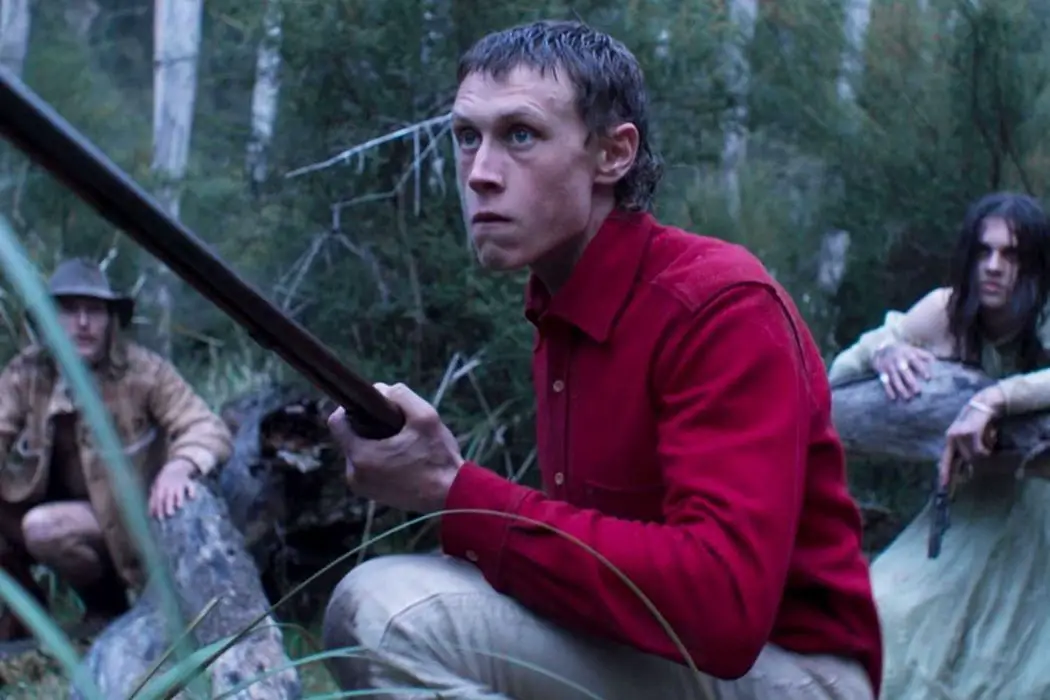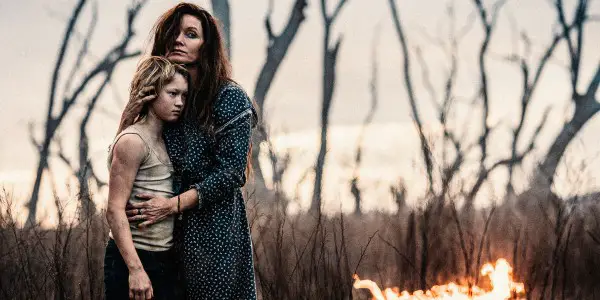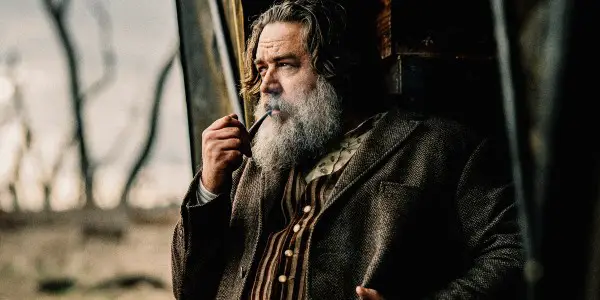Director Justin Kurzel Talks TRUE HISTORY OF THE KELLY GANG

In the darkness of night, a train charges through the Australian wilderness. Further down the tracks, waiting for an attack is The Ned Kelly Gang, an army of young men in dresses led by bushranger Ned Kelly. It’s a surreal image that feels almost dreamlike, both darkly humorous while also haunting.
Most of Ned Kelly’s story is mostly alien to those here in the States. But, in Australia, he’s a significant cultural figure, the subject of numerous biographies and works of art. On film, he’s been played by everyone from an Australian football player (Bobby Chitty), to a rockstar (Mick Jagger), and even an Oscar-winning actor (Health Ledger). Now, Kelly is once again back on screen in the form of a new picture titled True Story of the Kelly Gang, based on an award-winning 2001 novel of the same name that reimagines Kelly’s story from his perspective.
I recently had the pleasure to talk with the new film’s director, Justin Kurzel, just before its release. Kurzel, an Australian himself, has built a career on a diverse range of projects from true-crime pictures (Snowtown), epic-scale Shakespeare adaptations (Macbeth), and even bringing a famous video-game series to the big screen (Assasin’s Creed). Here, he spoke on Kelly’s significance to Australian culture, the role of music in his film, and how this adaptation of the story is unique from those that have come before.

Jesse Nussman for Film Inquiry: Obviously, the story of Ned Kelly is one that’s been told in a multitude of books and even films. What was it that drew you to this story, and what did you feel you could bring out of it that was perhaps different than something we’d seen before?
Justin Kurzel: Well, I guess it was kind of unusual because the book was kind of a first-person account from Ned Kelly, and that liberates you in a certain way. You know straight away, it is not going to be a traditional biopic where you’re going through the appropriations of what Ned was and what happened. He was telling his story through letters to his unborn child because he was trying to say his own history and for his daughter to understand the truth of what happened.
That resonated for me because, growing up, Ned Kelly was sort of carnival. There was a 20-foot Ned Kelly in our little town; you could see his armor, there’s Ned Kelly pie. So, he had become a myth and a legend as a figure throughout our history. It was interesting to have a character that was trying to write against that. Then you had little things like the dresses, which always fascinated me in the book, with these guys wearing dresses as armor or warfare to fight against the British. That opened up a whole world to me that was different from anything that had come before.
Yeah, the dresses are a fun, darkly comic little detail. What do you think it is about Ned Kelly that makes him this huge cultural figure in Australia? Is it equivalent to someone like Jesse James here in the U.S.?
Justin Kurzel: Yeah, I mean he’s anti-authority, and Australians love that. I think he was seen as sort of the Robin Hood of Australia for a long time, who would rob banks or stage-coaches and distribute the wealth. And, I also think the armor that he used was imaginative and inventive, using it to fight the police. That was something I feel captured people’s imaginations.
You know, we’re strange in Australia, we don’t quite like to look beyond our very short, white history. I think we have a very uncomfortable relationship with the brutality of what happened here. So, I do think we gravitate toward things that are a little bit easy for us to identify with. I think there’s also something about Ned where he connects with a lot of white alpha-men, and that’s because of the rebellion in him, and the anti-authority nature of him, standing there with a suit of armor shooting against police. That image just seems to resonate in some way. So, there’s an aurora about him that I think author Peter Carey, and we were poking and prodding at a bit.
Obviously, I want to ask you about your Ned Kelly, played by George MacKay, who many people will likely recognize from 1917. What was it about him that stood out to you and made him right for the roll?
Justin Kurzel: George just has a specification about him to where, as soon as he walked into the room, I thought, “this guy could write these things.” In both the film and the book, Ned Kelly is quite a wordsmith. So, we wanted whoever we cast in the role to have an inherent sophistication to him and that there was something good in him that you could see transform into something quite violent and brutal. And, George MacKay is one of the nicest bloody people you could ever meet, and he’s so considerate and gentle and oozes a kind of goodness.
The idea of taking that and shifting it into something brutal, which is what he becomes in the end, was a massive part of why we cast him. But, I’ve always been a huge fan of him. I auditioned him way back when I was doing Macbeth, saw him in a couple of films, and thought he was wonderful in Captain Fantastic. So, when he came in to audition, I just thought he was right for the role.
Another person I want to ask you about is Russell Crowe, who I thought was quite delightful and charming in the film, even though he is playing a pretty brutal character. I don’t want to give it away fully, but there is a song he sings in the movie that I heard he came up with himself. What’s the story behind that? He sounds like a very musical person, even if most people don’t think of him that way.
Justin Kurzel: When I went to his house for the first time to talk to him about the roll, we ended up listening to music the whole night. He’s incredibly musical. So, I went back to Shaun [Grant], our writer, and said: “It’d be so fantastic if Russell could sing in the film and bring in joy and light to a pretty desolate place.” The song is a kind of gentle anti-authoritarian song, but actually, the words are pretty f*cking awful. There’s a lot of that in Australia, a lot of songs about anti-authority that are usually wrapped up in a little light twinkle of a song but with pretty biting lyrics.
We found a few songs in Australia from the ’70s and ’80s that we could have relied on, but Russell said, “I want to do it, I want to come up with it.” It’s a great song, and the meaning of it is so fantastic that we got Ned to use it later in the film, and it became a significant moment. But, Russell is amazing and brought so much to it and is so loyal to the film.

Is he someone who is just coming up with songs all the time or has a guitar on set playing?
Justin Kurzel: Well, he did on ours, in terms of having a guitar on set because his character, Harry Power, did. We had another song in the film that we didn’t use, but the idea was Harry was sort of a traveling one-man-band. So it was great! We were constantly playing, a lot of people were. We had a lot of musicians on set. We had Marlon Williams playing a role in the film, and the boys joined a band, even wrote an album two weeks before they started filming and played a gig. It was a really interesting and beautiful set to walk on to because most people were playing instruments or writing songs. So, it was good fun.
One of the things I found really interesting about the movie is the balance between this very historical story, while also having this very modern, almost punk-rock aesthetic to the whole thing. How are you able to ride that fine line, is it something in the script stage or during production?
Justin Kurzel: Well, I don’t know. A lot of the references that I had for the gang were references to bands from the ’70s and early ’80s in Australia. Their silhouette and the way they looked and felt reminded me of shots of men in groups in colonial Australia. I didn’t necessarily set out to make it like that. It just happened organically. Once our budget was cut by half, I wasn’t doing a full period film. I couldn’t afford it.
But it was liberating. We were thinking, “what could we do and what will feel familiar for an audience.” I didn’t want the audience to be looking at the gang and thinking, “they look so foreign, and they got these Irish accents, and I can’t quite feel them because they are too far away.” I wanted the boys to feel like kids that you could walk past on the street now but without it being modern. I wanted something familiar and primal and had an energy and an attitude about it, while also not be shackled by any pastiche of a period.

Justin Kurzel: An Australian film called Wake In Fright, which was made in the ’70s by Ted Kotcheff, who was a Canadian director who directed First Blood and Weekend at Bernie’s for some reason (laughs). He’s an amazing director who made this film based on an Australian novel about an Englishman hitching in the outback, out in the middle of nowhere. He loses all his money in the middle of the night gambling. It’s one of the most haunting and horror driven films that’s probably inspired a hell of a lot of Australian directors, definitely me. It’s a great, great film!
Film Inquiry thanks Justin Kurzel for taking the time to speak with us.
True History of the Kelly Gang is available to rent on Vudu and on digital and on demand April 24, 2020.
Does content like this matter to you?
Become a Member and support film journalism. Unlock access to all of Film Inquiry`s great articles. Join a community of like-minded readers who are passionate about cinema - get access to our private members Network, give back to independent filmmakers, and more.













